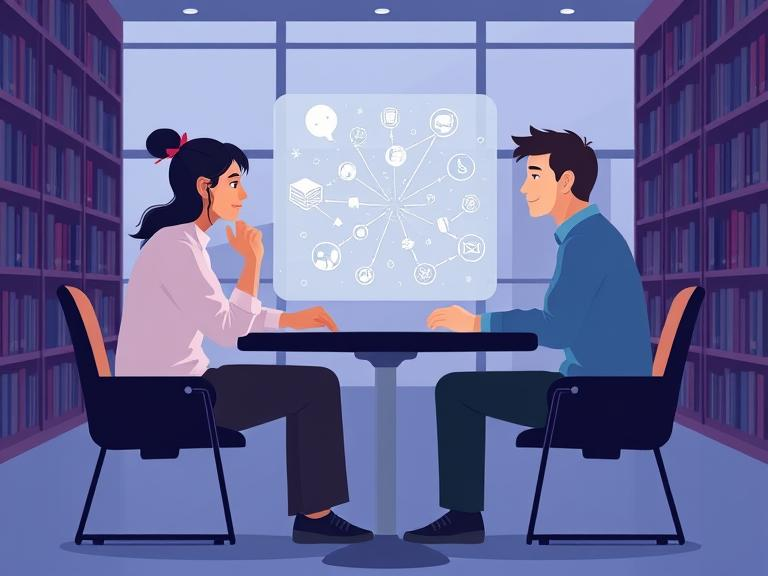Purpose-built activities that generate connected assessment evidence within Canvas pages
Capture authentic learning evidence at specific moments throughout the semester with five purpose-built activities. Create progressive portfolios that document student development from quick engagement verification to comprehensive learning journals, all seamlessly integrated within your Canvas workflow.
Capture the Complete Learning Journey

Learning Journals
Build comprehensive evidence over time
Build evidence of learning over time while making student development visible. Learning Journals create dedicated spaces where students document their thinking directly within Canvas content, making reflection part of the learning process rather than an afterthought.
By embedding journal prompts at key learning moments, you create a comprehensive record of student development that connects concepts across modules and provides powerful evidence of growth.
Use Cases
Clinical Skills Development
Track clinical skill development throughout a program with embedded reflection points at critical learning moments.
Students build a comprehensive portfolio demonstrating their growth over time, while educators gain real-time insights into skill acquisition.
Perfect for nursing, medicine, and allied health programs requiring evidence of competency development.
Competency Based
Skill Progression
Reflective Practice
Workplace-Integrated Learning
Bridge the gap between classroom learning and workplace experiences with structured reflection prompts.
Students reflect on how theoretical concepts apply in workplace settings, creating evidence of applied learning.
Ideal for internships, placements, and project-based courses where connecting theory to practice is essential.
Knowledge Application
Transfer Learning
Professional Identity
First-Year Experience
Guide first-year students through their academic transition with consistent reflection practices embedded throughout orientation and introductory courses.
Build metacognitive skills while collecting evidence of student adaptation and identifying those who may need additional support early in their journey.
Metacognition
Self-Regulation
Learning Adaptation
Gather Immediate Evidence of Understanding
<span data-metadata=""><span data-buffer="">Quick Reflect
Capture point-in-time understanding instantly
Capture student thinking at specific points in time with focused reflection activities that can’t be revised after submission. Quick Reflect activities are designed to document immediate insights and observations directly within Canvas content, providing authentic snapshots of student understanding.
By strategically placing these activities at key learning moments, you create valuable evidence of comprehension while encouraging students to articulate their thinking.

Use Cases
CONCEPT VERIFICATION
Knowledge Confirmation
Early Intervention
Learning Sequence
Pre-Lab Preparation
Procedural Understanding
Safety Compliance
Preparation Verification
Knowledge Application
Critical Thinking
Applied Knowledge
Decision-Making Process
<span data-metadata=""><span data-buffer="">Enable Peer-to-Peer Learning

Reflect & Compare
See how others approach the same challenge
Encourage deeper understanding through guided comparison of perspectives. Reflect & Compare activities require students to first articulate their own thinking before seeing how peers approached the same question.
This creates a low-pressure peer learning environment directly within Canvas content, where students can reflect on different approaches without the formality of discussion boards. The process promotes diverse thinking while providing evidence of how students engage with alternative perspectives.
Use Cases
Multiple Solution Problems
Showcase the variety of valid approaches to open-ended problems. Students submit their own solution first, then gain insight from seeing multiple peer perspectives, broadening their understanding of the concept.
Especially valuable in mathematics, engineering, creative disciplines, and any field where multiple solution paths exist.
Critical Thinking
Solution Diversity
Analytical Skills
Diverse Perspectives Analysis
Develop students’ ability to recognize and appreciate diverse viewpoints on complex topics. After forming their own analysis, students can compare their thinking with peers, creating evidence of perspective-taking abilities.
Particularly effective in humanities, social sciences, ethics, and cultural studies courses.
Empathy Development
Cognitive Flexibility
Cultural Awareness
Community Knowledge Building
Harness the power of class knowledge to build a richer understanding of complex concepts. Students contribute their individual insights first, then benefit from the collective wisdom of the group, all within the flow of learning content.
Ideal for large enrollment courses, online learning communities, and collaborative knowledge-building environments.
Collaborative Learning
Knowledge Synthesis
Community Building
Consolidate Learning for Deeper Understanding
Reflect, Review & Export
Build and export reflection portfolios
Transform individual reflection moments into comprehensive learning portfolios. Reflect, Review & Export activities allow students to compile their reflections from throughout a course, review their development over time, and export this evidence as a document for further use.
This approach creates a powerful record of the learning journey, helps students recognise their own growth, and provides a foundation for more substantial assessments or professional documentation.

Use Cases
Assessment Preparation
Build toward major assessments through structured reflection activities throughout the course. Students collect their thoughts and work progressively, then review and export their compiled reflections as a foundation for final assignments.
Particularly valuable in writing-intensive courses, capstone projects, and research-based learning environments.
Iterative Development
Writing Process
Evidence Synthesis
Professional Portfolio Development
Create comprehensive evidence of professional skills and competencies developed throughout a program. Students reflect on their learning at key points, then compile and export these reflections into professional documentation for internships, placement applications, or employment.
Ideal for professional programs, career preparation courses, and experiential learning contexts.
Professional Identity
Competency Evidence
Career Preparation
Learning Progression Analysis
Enable students to see their own intellectual development by reviewing reflections from different points in their learning journey. The ability to compile and export these reflections supports deeper metacognitive awareness and self-assessment.
Particularly effective in long-term courses, sequential learning programs, and developmental education contexts.
Metacognition
Self-Assessment
Progressive Development
Simplify Assessment While Enriching Evidence

Connected Journal
Multiple reflections, one assignment grade
Streamline assessment workflows without sacrificing evidence quality. Connected Journals link multiple reflection activities across your course to a single Canvas assignment, reducing grading complexity while still capturing rich evidence of student learning.
By strategically placing reflection points at key learning moments throughout your content, you create a comprehensive picture of student development that flows directly into your assessment workflow, making evidence collection efficient and meaningful.
Use Cases
Weekly Reflection Sequences
Implement weekly reflection activities throughout a course that connect to a single end-of-term assignment. Students engage regularly with content while instructors maintain a manageable grading workflow.
Perfect for semester-long courses, sequential learning environments, and programs that value ongoing reflection without assessment overload.
Progressive Learning
Continuous Engagement
Streamlined Assessment
Professional Practice Documentation
Document student experiences across multiple practicum or clinical sessions while maintaining a single assessment point.
Students record observations and reflections at each practice opportunity, building a comprehensive portfolio that instructors can evaluate holistically.
Ideal for clinical placements, field experiences, and professional preparation programs.
Applied Learning
Practice Integration
Evidence Compilation
Multimodal Learning Integration
Unite student reflections across various learning platforms and activities into a cohesive assessment framework. Students reflect on readings, videos, simulations, and discussions throughout the course, with all reflections linking to one Canvas assignment.
Especially valuable for blended learning environments, courses utilizing multiple media formats, and integrated learning experiences.
Learning Integration
Transfer Knowledge
Media Literacy

Meet Sean!
Sean is our co-founder and CEO, and he’ll show you how we can personalise Stackle to fit your needs down to a tee.
Proudly supported by the Advance Queensland initiative
